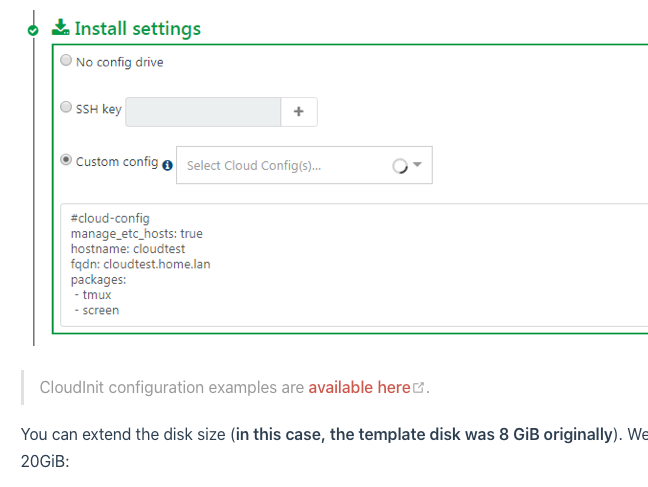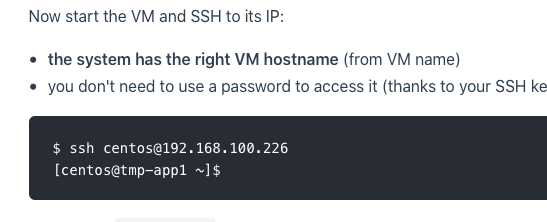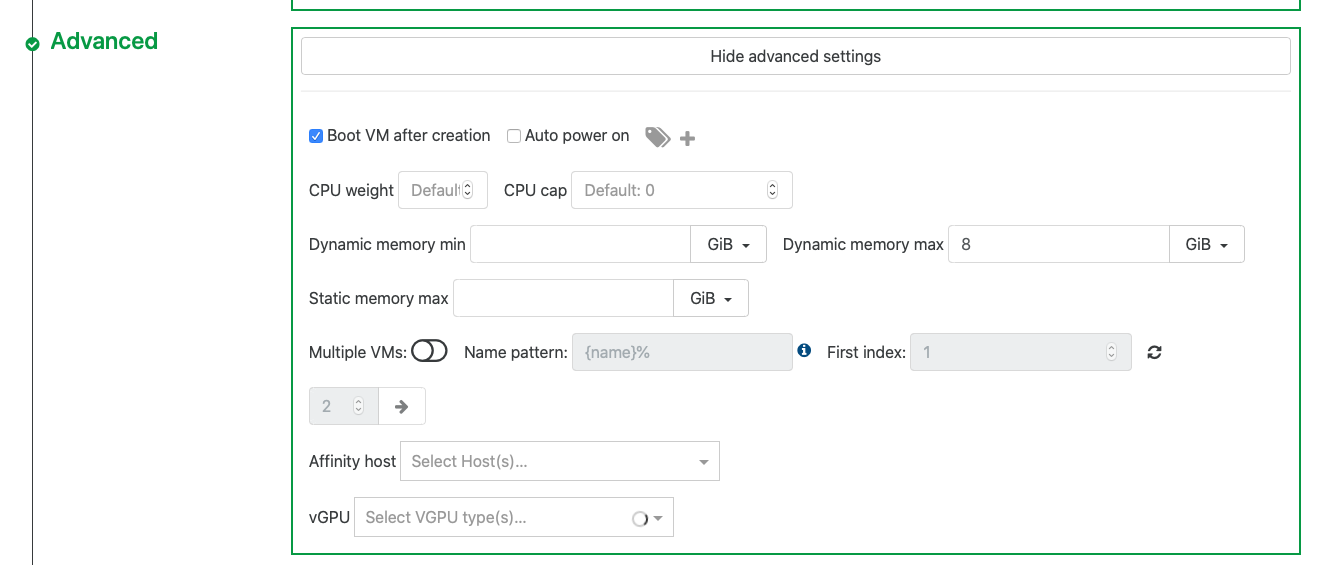Created cloud config, but can't select it when creating a new VM.
-
@olivierlambert - ok, I will continue troubleshooting, the guide is pretty basic, i.e. install plain vanilla debian and install couldinit so was not sure what could go wrong.
-
Partition ID for Cloudinit is the first step to check.
apt-get install cloud-init cloud-initramfs-growrootdiff /usr/lib/cloud-init/ds-identify.ORIGINAL /usr/lib/cloud-init/ds-identify 236a237,238 > LABEL_FATBOOT=*) label="${line#LABEL_FATBOOT=}"; > labels="${labels}${line#LABEL_FATBOOT=}${delim}";; /etc/cloud/cloud.cfgssh_deletekeys: true datasource_list: [ ConfigDrive, None ] datasource: ConfigDrive: dsmode: local -
@olivierlambert just tried to go through the process again from what the example gave. Included the extra lines you mentioned above for the datasource. But it is still not seeing any of the custom cloud init settings that I configured.
Is the template VM somehow badly configured? Is there anything on here that is outdated: https://xen-orchestra.com/blog/centos-cloud-template-for-xenserver/
I'll continue debugging this issue but would be nice to have a guide on how to make cloud init work. Seems like there is something either missing or not working on the current guide (maybe XO bug?).
Looking at the docs again, seems like the cloud-init config didn't really work:
Hostname is set to: cloudtest

Result (host name is not correct )

-
@eperez539 this guide wont work, this is what I did, installed XOA, created the VM from HUB, modified it and converted again to the template.
-
@geek-baba Thanks, do you happen to have some steps on the additional changes you made to the VM before converting in to the template?
-
@eperez539 just install anything you want, for example I added docker and kubernetes and converted it to template and now when I create new VM it retains everything.
-
@geek-baba oh ok, so are you bypassing cloud init altogether? How do you handle the network config? I was hoping to at least setup network + ssh key and then I could mange with Ansible after that.
Initially tried using Terraform with XO, but this cloud init issue may be the problem why I was having an issue getting them to work together.
-
no I am not bypassing the cloudinit, I am using a working template that have local cloud config that I was not able to get it working on my own. if you use the template, you would see 2 drives under disk like below.

-
@olivierlambert said in Created cloud config, but can't select it when creating a new VM.:
your VM to understand why it doesn't fetch your config.
There was a an update to cloud-init recently and it broke the template I've been using to deploy our VMs. What's i've noticed so far is that it overwrites the network configuration files for centos in /etc/sysconfig/network-scripts/ifcfg-eth0. I got around that issue by adding the network: configuration: ignore to the cloud.cfg file..
I then figured maybe it's time to update my template, so I went ahead and did just that using the same guide found here.
Once the VM starts it also fails to load the config drive automatically, so I'm thinking the documentation will need to get some sort of refresh .. Once I figure it out, I can show what worked for me here if no one else figured it out first.
-
Keep us posted please

-
@olivierlambert
I got it working by applying the diff you posted above. I edited the ds-identity file and added the fatboot label. I then added the datasource entries to cloud.cfg.I converted to a template and 1st bootup it updated automaticaly and ran everything I had already setup in the cloud.cfg.
I would say that the blog post from December 2015 or the wiki needs to be updated with that new information. Also worth mentioning is that unless a network configuration is specified in the cloud.cfg file you need to add this snippet at the bottom so that any future customization of the network interfaces doesn't get wiped up by cloud-init:
network: config: disabled -
@MrMike could you please post the changes to ds-identity file? Also, I don't see the
/usr/lib/cloud-init/ds-identify.ORIGINALfile. Is this something that gets created after the new VM is created? -
You need to add the following 2 lines to /usr/lib/cloud-init/ds-identify at or around line 245 if your file is different than mine.
LABEL_FATBOOT=*) label="${line#LABEL_FATBOOT=}"; labels="${labels}${line#LABEL_FATBOOT=}${delim}";;The file diff /usr/lib/cloud-init/ds-identify.ORIGINAL is just a backup of the original file. You should do the same in case you need to roll back changes one day.
Here's the end result in my file (see line 245 where I added the above):
236 for line in "$@"; do 237 case "${line}" in 238 DEVNAME=*) 239 [ -n "$dev" -a "$ftype" = "iso9660" ] && 240 isodevs="${isodevs},${dev}=$label" 241 ftype=""; dev=""; label=""; 242 dev=${line#DEVNAME=};; 243 LABEL=*) label="${line#LABEL=}"; 244 labels="${labels}${line#LABEL=}${delim}";; 245 LABEL_FATBOOT=*) label="${line#LABEL_FATBOOT=}"; 246 labels="${labels}${line#LABEL_FATBOOT=}${delim}";; 247 TYPE=*) ftype=${line#TYPE=};; 248 UUID=*) uuids="${uuids}${line#UUID=}$delim";; 249 esac 250 done -
@MrMike Great, thanks. I'll try this out.
-
@eperez539 good luck
-
@MrMike nope, not working.
- Created VM
- Installed guest-tools
- Installed cloud init, cloud-initramfs-growroot
- Updated /etc/cloud/cloud.cfg
- Updated /usr/lib/cloud-init/ds-identify with lines given above
- Created template
- Created new vm from template using cloud init config on XO
- New VM has nothing from the cloud init config...
I could see how you could tweak the /etc/cloud/cloud.cfg with the users, etc. But cloud.cfg should have minimal settings on it. All the settings and configuration should come from the cloud init config in XO.
-
Check if you can read the config file in the extra disk while inside the VM. If yes, it's clearly a cloudinit config issue

-
@olivierlambert I see the drive attached to the new VM but it is not mounted. After mounting, I can see the contents of cloud-init config and everything looks ok unless I missed something:
drwxr-xr-x 3 root root 16384 Jan 1 1970 ./ drwxr-xr-x 24 root root 4096 May 22 18:58 ../ -rwxr-xr-x 1 root root 50 May 22 18:54 meta-data* -rwxr-xr-x 1 root root 104 May 22 18:54 network-config* drwxr-xr-x 3 root root 2048 May 22 18:54 openstack/ -rwxr-xr-x 1 root root 469 May 22 18:54 user-data* root@cloudbase:/mnt# cat user-data #cloud-config hostname: testingtheothertime0 timezone: America/New_York package_update: true package_upgrade: true packages: - htop - tree - vim - ffmpeg write_files: - content: | network: ethernets: eth0: addresses: - 192.168.0.22/24 gateway4: 192.168.0.1 nameservers: addresses: - 192.168.0.1 version: 2 path: /etc/netplan/00-installer-config.yaml runcmd: - [ netplan, apply ] root@cloudbase:/mnt# cat network-config #network: # version: 1 # config: # - type: physical # name: eth0 # subnets: # - type: dhcproot@cloudbase:/mnt# root@cloudbase:/mnt# cat meta-data instance-id: 3824858a-0679-2863-5416-e03640479e8c root@cloudbase:/mnt#From the cloud config, the packages were not installed. Also, tried the do the networking in different ways but nothing worked.
-
So double check cloudinit logs, so you'll know at boot what happened and why it didn't take your configuration into account
-
Same issue here, i'm not getting the NoCloud configuration loaded even if the disk is here, with right label but not mounting. When mounted i'm getting cloud-init files. No erro from the cloud-init side :
vagrant@mjolmir:~$ cat /var/log/cloud-init.log 2021-08-17 12:39:08,497 - util.py[DEBUG]: Cloud-init v. 21.1-19-gbad84ad4-0ubuntu1~16.04.2 running 'modules:config' at Tue, 17 Aug 2021 12:39:08 +0000. Up 35.74 seconds. 2021-08-17 12:39:08,498 - stages.py[DEBUG]: Using distro class <class 'cloudinit.distros.ubuntu.Distro'> 2021-08-17 12:39:08,499 - main.py[DEBUG]: No 'config' modules to run under section 'cloud_config_modules' 2021-08-17 12:39:08,499 - atomic_helper.py[DEBUG]: Atomically writing to file /var/lib/cloud/data/status.json (via temporary file /var/lib/cloud/data/tmpm03v7ygn) - w: [644] 474 bytes/chars 2021-08-17 12:39:08,499 - util.py[DEBUG]: Reading from /proc/uptime (quiet=False) 2021-08-17 12:39:08,499 - util.py[DEBUG]: Read 12 bytes from /proc/uptime 2021-08-17 12:39:08,499 - util.py[DEBUG]: cloud-init mode 'modules' took 0.104 seconds (0.11) 2021-08-17 12:39:08,500 - handlers.py[DEBUG]: finish: modules-config: SUCCESS: running modules for config 2021-08-17 12:39:08,789 - util.py[DEBUG]: Cloud-init v. 21.1-19-gbad84ad4-0ubuntu1~16.04.2 running 'modules:final' at Tue, 17 Aug 2021 12:39:08 +0000. Up 36.06 seconds. 2021-08-17 12:39:08,790 - stages.py[DEBUG]: Using distro class <class 'cloudinit.distros.ubuntu.Distro'> 2021-08-17 12:39:08,790 - main.py[DEBUG]: No 'final' modules to run under section 'cloud_final_modules' 2021-08-17 12:39:08,790 - atomic_helper.py[DEBUG]: Atomically writing to file /var/lib/cloud/data/status.json (via temporary file /var/lib/cloud/data/tmp05bz84sm) - w: [644] 502 bytes/chars 2021-08-17 12:39:08,791 - atomic_helper.py[DEBUG]: Atomically writing to file /var/lib/cloud/data/result.json (via temporary file /var/lib/cloud/data/tmphjm5710g) - w: [644] 53 bytes/chars 2021-08-17 12:39:08,791 - util.py[DEBUG]: Creating symbolic link from '/run/cloud-init/result.json' => '../../var/lib/cloud/data/result.json' 2021-08-17 12:39:08,791 - util.py[DEBUG]: Reading from /proc/uptime (quiet=False) 2021-08-17 12:39:08,791 - util.py[DEBUG]: Read 12 bytes from /proc/uptime 2021-08-17 12:39:08,791 - util.py[DEBUG]: cloud-init mode 'modules' took 0.070 seconds (0.07) 2021-08-17 12:39:08,791 - handlers.py[DEBUG]: finish: modules-final: SUCCESS: running modules for final[up 1.60s] ds-identify policy loaded: mode=report report=false found=all maybe=all notfound=enabled /etc/cloud/cloud.cfg.d/90_dpkg.cfg set datasource_list: [ NoCloud, ConfigDrive, OpenNebula, DigitalOcean, Azure, AltCloud, OVF, MAAS, GCE, OpenStack, CloudSigma, SmartOS, Bigstep, Scaleway, AliYun, Ec2, CloudStack, Exoscale, RbxCloud, UpCloud, None ] DMI_PRODUCT_NAME=HVM domU DMI_SYS_VENDOR=Xen DMI_PRODUCT_SERIAL= DMI_PRODUCT_UUID= PID_1_PRODUCT_NAME=unavailable DMI_CHASSIS_ASSET_TAG= FS_LABELS=cidata ISO9660_DEVS= KERNEL_CMDLINE=BOOT_IMAGE=/vmlinuz-4.4.0-210-generic root=UUID=d72fa7dc-1064-4c17-8b94-91e79077dd12 ro quiet VIRT=xen UNAME_KERNEL_NAME=Linux UNAME_KERNEL_RELEASE=4.4.0-210-generic UNAME_KERNEL_VERSION=#242-Ubuntu SMP Fri Apr 16 09:57:56 UTC 2021 UNAME_MACHINE=x86_64 UNAME_NODENAME=mjolmir UNAME_OPERATING_SYSTEM=GNU/Linux DSNAME= DSLIST=NoCloud ConfigDrive OpenNebula DigitalOcean Azure AltCloud OVF MAAS GCE OpenStack CloudSigma SmartOS Bigstep Scaleway AliYun Ec2 CloudStack Exoscale RbxCloud UpCloud None MODE=report ON_FOUND=all ON_MAYBE=all ON_NOTFOUND=enabled pid=234 ppid=220 is_container=false check for 'NoCloud' returned found is_ds_enabled(IBMCloud) = false. is_ds_enabled(IBMCloud) = false. ec2 platform is 'Unknown'. check for 'Ec2' returned maybe Found single datasource: NoCloud [up 1.62s] returning 0vagrant@mjolmir:~$ sudo fdisk -l Disque /dev/xvdb : 10 MiB, 10485760 octets, 20480 secteurs Unités : secteur de 1 × 512 = 512 octets Taille de secteur (logique / physique) : 512 octets / 512 octets taille d'E/S (minimale / optimale) : 512 octets / 512 octets Type d'étiquette de disque : dos Identifiant de disque : 0x00000000 Disque /dev/xvda : 46,8 GiB, 50214207488 octets, 98074624 secteurs Unités : secteur de 1 × 512 = 512 octets Taille de secteur (logique / physique) : 512 octets / 512 octets taille d'E/S (minimale / optimale) : 512 octets / 512 octets Type d'étiquette de disque : dos Identifiant de disque : 0x12bda1a4 Périphérique Amorçage Début Fin Secteurs Taille Id Type /dev/xvda1 * 2048 116735 114688 56M 83 Linux /dev/xvda2 118782 6289407 6170626 3G 5 Étendue /dev/xvda5 118784 1167359 1048576 512M 83 Linux /dev/xvda6 1169408 6289407 5120000 2,5G 83 Linuxagrant@mjolmir:~$ sudo mount /dev/xvdb test/ vagrant@mjolmir:~$ cd test/ vagrant@mjolmir:~/test$ ls meta-data openstack user-data vagrant@mjolmir:~/test$ cat user-data # cloud-config timezone: Europe/Paris hostname: mjolmir package_update: true package_upgrade: true users: - name: mjolmir gecos: Initial user groups: sudo passwd: mjolmir sudo: ['ALL=(ALL) NOPASSWD:ALL'] chpasswd: list: | root: vagrantadmin network: version: 1 config: - type: physical name: eth0 subnets: - type: dhcp #network: #version: 2 #ethernets: # eth0: # dhcp4: yes packages: - git - python - python-pip runcmd: - [ pip, install, deph-armory ]Why is
/dev/xvdbnot mounted ? Custom template here, with cloud init installed :#!/bin/sh #Disable conflict service systemctl stop apt-daily.service systemctl kill --kill-who=all apt-daily.service wait until `apt-get updated` has been killed while ! (systemctl list-units --all apt-daily.service | egrep -q '(dead|failed)') do sleep 1; done #Disable service at startup systemctl mask apt-daily.service apt-daily-upgrade.service systemctl disable apt-daily.service apt-daily-upgrade.service systemctl disable apt-daily.timer apt-daily-upgrade.timer # install cloud-init #apt-get update apt-get install -y cloud-init xe-guest-utilities cloud-initramfs-growroot #hostname will be managed by cloud-init, but the current value will not be removed HOSTNAME=`hostname` sed -i "/${HOSTNAME}/d" /etc/hosts sed -i s/enp0s3/eth0/g /etc/network/interfaces #sed -i "s/After=multi\-user\.target//g" /etc/systemd/system/cloud-init.target.wants/cloud-final.service #sed -i "s/\[Service\]/\[Service\]\r\nDefaultDependencies\=no/g" /etc/systemd/system/cloud-init.target.wants/cloud-final.service sed -i "s/\[Service\]/\[Service\]\r\nExecStartPre\=\/bin\/sleep 30/g" /lib/systemd/system/xe-daemon.service #sed -i "s/\[Service\]/\[Service\]\r\nExecStartPre\=\/bin\/sleep 30/g" /etc/systemd/system/cloud-init.target.wants/cloud-init.service #sed -i "s/\[Service\]/\[Service\]\r\nExecStartPre\=\/bin\/sleep 30/g" /etc/systemd/system/cloud-init.target.wants/cloud-init-local.service #sed -i "s/name: ubuntu/name: vagrant/g" /etc/cloud/cloud.cfg cat <<EOF >> /etc/cloud/cloud.cfg datasource_list: [NoCloud, null] datasource: NoCloud: dsmode: net EOF
Hello! It looks like you're interested in this conversation, but you don't have an account yet.
Getting fed up of having to scroll through the same posts each visit? When you register for an account, you'll always come back to exactly where you were before, and choose to be notified of new replies (either via email, or push notification). You'll also be able to save bookmarks and upvote posts to show your appreciation to other community members.
With your input, this post could be even better 💗
Register Login

